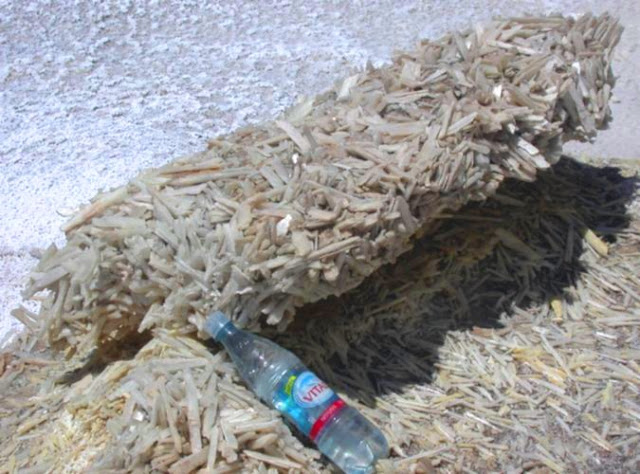Geologist discovers Whirlwinds of crystals called gravel devils in Andes mountains
 |
| After the gravel devils move the gypsum, some of it clumps together when exposed to groundwater. Credit Kathleen Benison |
Large hunks of gypsum swept between two volcanoes
Geologist Kathleen Benison was working in the Atacama desert in Chile where the harsh environment creates large bladed-habit gypsum crystals due to evaporation. The crystals can also be found broken, heaped into piles or scattered around. How did this transport happen? The wind would have to be very strong, tornado force, to move the large crystals. And giant whirling dust devils are exactly what she saw.
There’s a lot to be learned from the winds in a Chilean desert-everything from surviving tornadoes on Earth to planning travel to Mars, with surviving climate change in between. And it took West Virginia University geologist Kathleen Benison to find it.
In 2007, Benison discovered an anomaly in saline lakes in the Chilean Andes and her subsequent work disproved the conventional wisdom that gravel was too big to be affected significantly by wind. Her work can help explain historic weather patterns on Earth and even help prepare for a trip to Mars, which is whipped by whirlwinds.
With changing environments due to global warming, conditions are becoming more extreme due to higher energy in the atmosphere. Deserts are expected to become drier and windier, and stronger and bigger dust devils (such as the Chilean gravel devils) may form.
Much of the world’s human population lives in and near deserts, so these changes could impact them. In addition, tornadoes seem to be getting more frequent and impacting a larger region with global warming. Even though gravel devils form on sunny days and tornadoes are spawn from thunderstorms, they have similar rotation, and both can be quite destructive. Understanding the gravel devils can help develop better plans, such as with building materials and designs, to limit destruction by tornadoes.
 |
| Gypsum crystals coat the ground of the Atacama desert in Chile. In this picture from Kathleen Benison, you can see how large they are. |
The above story is based Materials provided by West Virginia University – Eberly College of Arts and Sciences.